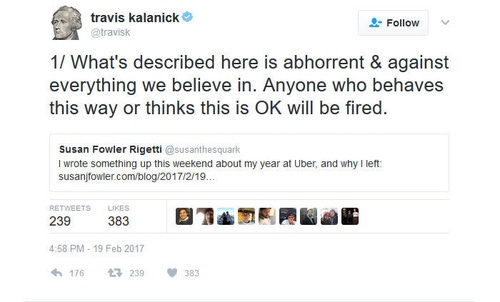Uber's HR Nightmare: Company Investigates Sexual Harassment Claims
A former Uber engineer says she was sexually harassed at the company, but HR refused to handle the situation, instead punishing her and perpetuating a toxic culture.

Inside the walls of Uber is what you might call an HR nightmare -- except human resources itself is perpetuating the nightmare.
Former Uber Engineer Susan Fowler, who left the company in December, says she was subjected to sexual harassment and discrimination since day one on the job and was punished, lied to and ignored when she tried to report it to both the HR department and her higher-ups.
Fowler made the allegations Sunday in a personal blog post, "Reflecting on one very, very strange year at Uber," accounting for why she left the ride-sharing company after only one year and lobbing some seriously shocking accusations against it.
Travis Kalanick, co-founder and CEO of the multi-billion dollar company, responded Sunday Tweeting that what was described in Fowler's blog is "abhorrent & against everything we believe in." As a result, Uber has hired former US Attorney General Eric Holder and his law partner Tammy Albarran to conduct an independent review into the issues Fowler outlined, along with Uber board member Arianna Huffington, General Counsel Angela Padilla and Chief Human Resources Officer Liane Hornsey.
Women in Comms' first networking breakfast and panel of 2017 is coming up on Wednesday, March 22, in Denver, Colorado, ahead of day two of the Cable Next-Gen Strategies conference. Register here to join us for what will be a great morning!
As for the allegations, Fowler says that on her first day on her new engineering team at Uber, her direct manager propositioned her for sex over chat. She took screen shots that she immediately shared with HR and upper management. While they agreed with her that this constituted harassment, they told her it was his first mistake and not a punishable one given that he was a "high performer." Fowler was also told she could join a new team or expect a justifiably bad performance review from this manager.
From there it only got worse as Fowler heard from other female engineers that it was not, in fact, even close to his first offense, even though all the women were told that and none got any retribution. Fowler also reported that the company culture was one in which managers would fight their peers and undermine their supervisors in attempts to take their jobs. The end result was chaos with projects being abandoned, nothing getting done and employees living in fear of reorganizations.
Fowler reports attempting to transfer several times, but being blocked because of so-called "performance problems" and bad reviews. She experienced several more incidences of sexism in the workplace, all of which she documented and submitted to HR. HR, however, suggested she was the common thread in all these problems, and her manager suggested she might be fired for reporting his manager to HR.
Fowler didn't name names in her blog post, nor share her documentation, but that should become clear in Uber's investigation into her accusations. As part of this, Uber says it will also look at overall diversity and inclusion. Kalanick wrote in an email to employees, obtained by Fortune, that it has 15.1% females in engineering, product management and scientist roles, a number that has not changed substantively in the last year and that is more or less in line with other major tech companies. He said the company will publish a broader diversity report in the coming months. (See A Vast Valley: Tech's Inexcusable Gender Gap.)
As TechCrunch points out in a blog post today, Uber isn't the only company still grappling with, and mishandling, sexism and sexual harassment in the workforce. This month's lawsuit against Magic Leap is another extreme example, but women -- and men -- working in the Valley have similar stories to share about their own experiences of sexism, bias and discrimination. It's a culture that's become endemic in the Valley. While it's often hard to prove sexism in lawsuits, public accounts like Fowler's help expose the problem and are hopefully a first step to changing toxic company cultures. (See Is Magic Leap a Mirage of Misogyny & Deceit?, Ellen Pao Returns to VC to Tackle Tech Diversity and Tales From the Valley: Bias, Sexism & Worse.)
— Sarah Thomas, 

 , Director, Women in Comms
, Director, Women in Comms
About the Author(s)
You May Also Like




_International_Software_Products.jpeg?width=300&auto=webp&quality=80&disable=upscale)







